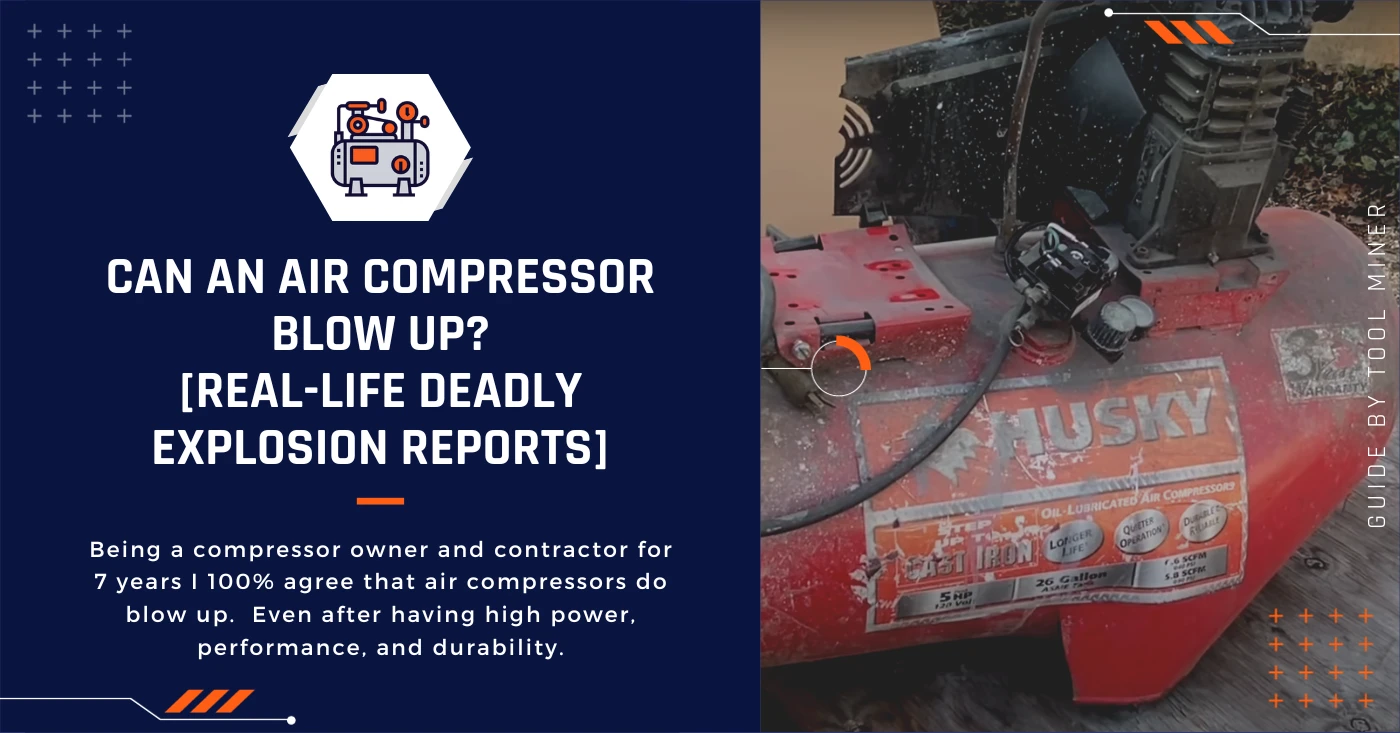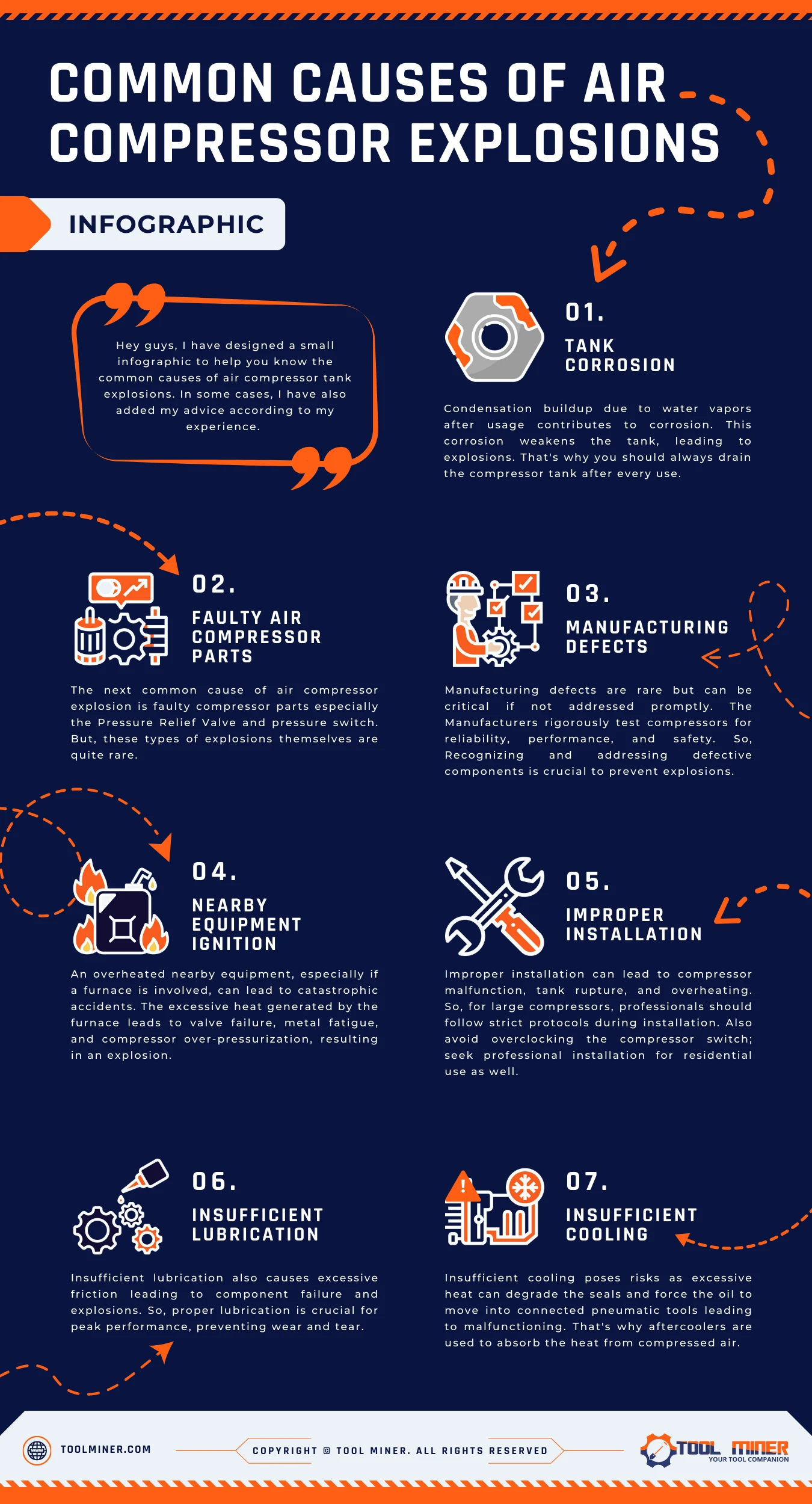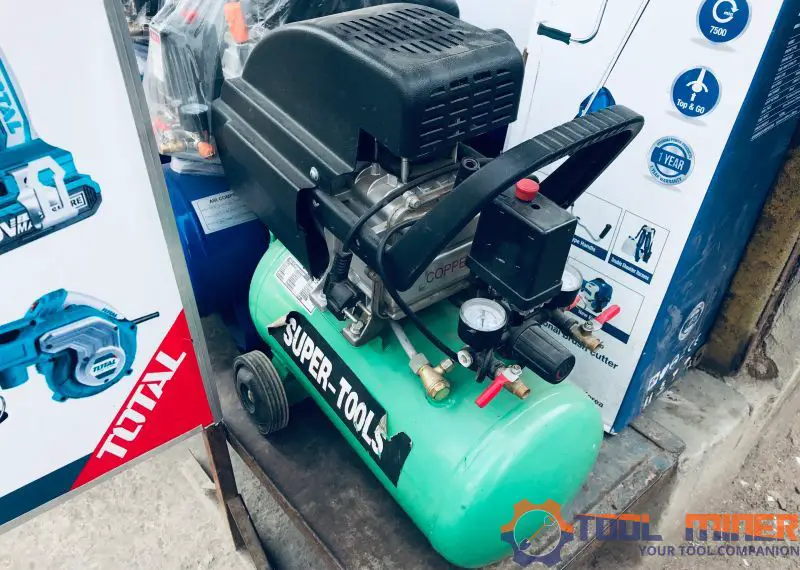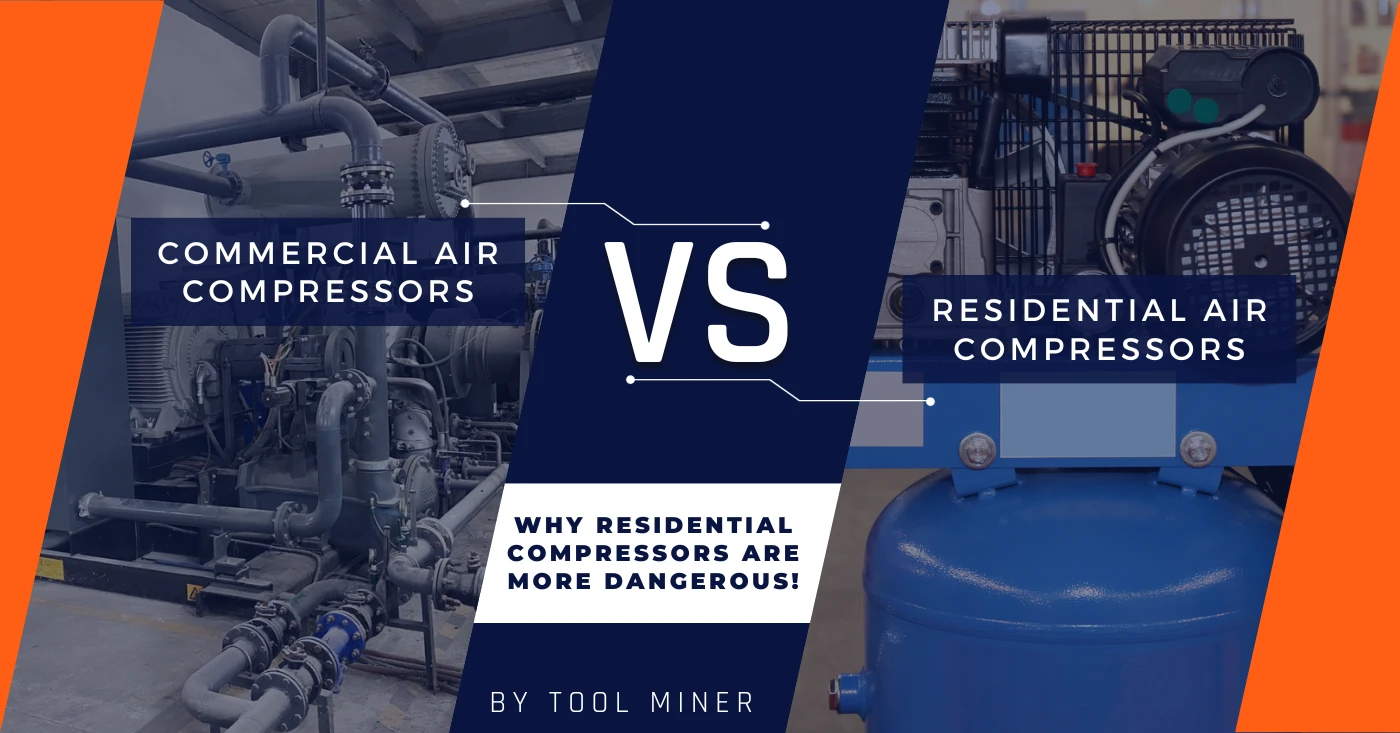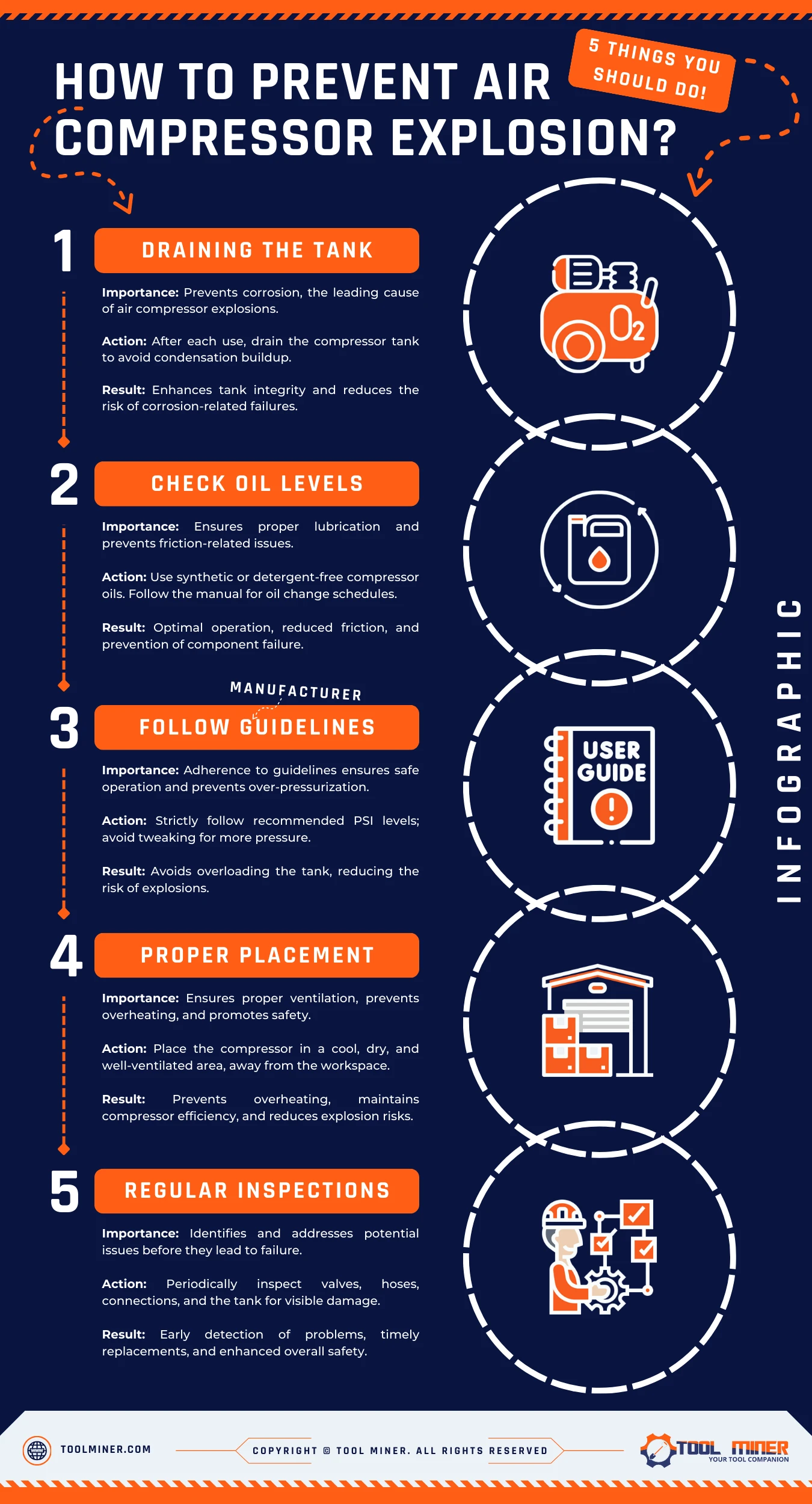Can an Air Compressor Blow Up? [Real-Life Deadly Explosion Reports]
Being a compressor owner and contractor for 7 years I 100% agree that air compressors do blow up. Even after having high power, performance, and durability.
Knowing the factors that contribute to these explosions is crucial for anyone working with these powerful machines.
The fact is these types of explosions are rare. So, many beginners just think of it as Myth… it’s not a myth.
That’s why I am gonna share insights, factors involved, real-life air compressor explosion accidents, and my experience regarding this issue.
Understanding Air Compressors
By definition, air compressors are tools that convert atmospheric air into pressurized compressed air and store it for different applications.
Based on mechanism, purpose, and compressor parts there are different types of air compressors (e.g., reciprocating, rotary screw, centrifugal).
These air compressor types are used for various applications in different industries. Starting from manufacturing plants to auto repair shops, healthcare, residential workshops, etc.
Adding to that they also power various types of air tools, making them a vital part of industrial manufacturing and a valuable addition to homeowners’ tool collections.
That’s the reason air compressor safety guidelines have been advised by industry experts. Plus, awareness of the dangers of compressed air is also put into motion.
Thus, knowing these air compressor problems and their causes is crucial for user safety.
Common Causes of Air Compressor Tank Explosions
Tank Corrosion
Common Causes
The leading cause of air compressor blow-ups is substantial corrosion of the tank. The rusted tank is not able to hold the pressurized air thus causing an explosion.
Excessive Condensation
This corrosion problem happens due to excessive condensation. It’s normal when you run a compressor water vapors are gonna form within the tank and after usage, these vapors convert to liquid and idly sit at the tank bottom.
Weakening Effect
This condensate causes a weakening effect inside the tank walls and starts corroding them as time passes. At some point, your compressor is not able to hold the high pressure and is not able to work properly.
Prevention
That’s the reason there is a drain valve at the tank bottom to regularly drain the tank after each use to prevent condensation buildup.
Faulty Air Compressor Parts
The next common cause of air compressor explosion is faulty compressor parts especially the Pressure Relief Valve and pressure switch.
But, these types of air compressor explosions themselves are quite rare. I haven’t faced this kind of issue in 10 years working with compressors.
Faulty Relief Valve
A faulty relief valve will be unable to control or limit the excessive pressure hence causing compressor blowup.
Faulty Pressure Switch
Due to a faulty pressure switch the air compressor fails to stop and the tank gets over-pressurized which can result in an explosion.
You should know that It is one of the common reasons behind compressor repairs. Without a good pressure switch the compressor cannot operate at all.
Manufacturing Defects
Rare Incidents
Manufacturing defects are rare but can be critical if not addressed promptly.
Manufacturing Quality Standard
Every manufacturer that design compressor has a rigorous test system to check the reliability, performance, and safety of air compressors.
They test compressors with extreme pressures to verify if they can withstand and the compressor parts won’t tear or wear down.
Identifying Defective Parts
Recognizing and addressing defective components is crucial to prevent explosions. Because wear and tear increases the temperature and causes the compressor to overheat and explode.
My Experience
I faced a compressor issue when I bought the new compressor.
It was a performance issue due to defective manufacturing.
It was my fault as I bought a local compressor. Here is a photo of it.
Nearby Equipment Ignition
Heat Risks
An overheated nearby equipment, especially if a furnace is involved, can lead to catastrophic accidents.
If you use a furnace or any other equipment in your shop that generates a lot of heat, then avoid putting your compressor there.
Excessive heat leads to valve failure, and metal fatigue. Further on it also causes the compressor to over-pressurize, resulting in an explosion.
Ventilation Importance
Never put your air compressor in confined spaces with poor ventilation. It is one of the leading causes of air compressor overheating. They should be stored in cool, dry, and, fully ventilated spaces for optimal working and user safety.
As the compressor works it dissipates heat that should be ventilated properly. That’s why Cooling Systems are installed for larger compressed air systems to avoid overheating problems.
My Experience
I know that because our shop has another room where the compressor and other machines are stored. So, my uncle and I never used our air compressor in that room due to this overheating issue.
Whenever there is a paint spray, stapling, or nailing project. we use a small air compressor or move our portable air compressor outside for work.
Improper Installation
Manufacturer Guidelines
Adhering to specific guidelines for safe use, maximum psi levels, and maintenance routines are essential.
Talk to your compressor’s company support for installation help. Read the air compressor safety guidelines and manuals that the Manufacturer provides with the compressor.
Strictly follow the company’s given product specifications and compressor maintenance schedules.
Garage or Shop Installation
If you have bought an air compressor for your garage or shop work, then I advise you to talk to the respective company support for installation.
Another safe way I highly recommend is to hire reputable air compressor services near you. They know the ins and outs of the air compressor and will guide and help you properly.
Professional Installation
As for installing large compressors for commercial use, professionals should be hired along with following strict protocols to avoid potential explosions.
Local Authorities and Safety Organizations should also verify these Commercial installations to be on the safe side and avoid any potential problems.
Risk & Over-Clocking
The risk of improper installation is severe. The compressor malfunctioning, tank rupture, and overheating are some of the things I wanna highlight. Another mistake the novice makes is over-clocking the compressor switch just to get higher pressure and more runtime.
You don’t play around with the pressure switch like that! Instead get a bigger compressor with 20, 30, 60, and 80-gallon capacities. Overclocking will only lead to a compressor breaking up or blowing up.
Insufficient Lubrication
Dangers of Friction
Insufficient lubrication leads to excessive air compressor friction that causes component failure and eventually explosion.
The high temperature produced due to friction also forces the oil into valves. If this oil is left unchecked it later dries up and when again heats up, it ignites or causes an explosion.
If your compressor goes without adequate lubrication for longer periods it causes excessive overheating due to wear and tear in internal parts thus causing explosion.
Optimal Operation
Correct lubrication is the key to peak performance. It prevents friction between moving parts, ensuring optimal operation.
My Experience
I switched to using synthetic oil in my compressor, and it’s been a game-changer. I went for the good stuff, like Royal Purple 01513, Powermate PX P018-0084SP, or OEM 38436721 All Season Select for my air compressors.
Synthetic oils have this magic touch that keeps everything running smoothly, avoiding wear, and tear, and those pesky friction problems.
My Advice
You should keep an eye on the oil levels. Regularly check and change air compressor oil as it becomes dark and less viscous.
Always consider using synthetic oils. You should check the compressor manual for the oil changing schedule.
Insufficient Cooling
Cooling Systems
Cooling systems are mainly used for larger air compressors or you can say industrial air compressors to prevent overheating and explosions.
These aftercoolers absorb the heat from compressed air. There are two types of air compressor cooling methods. The 1st is the Air Cooling and the 2nd is the Water Cooling method.
As for small compressors or garage/shop compressors they don’t need aftercoolers as they already have synthetic oil as coolant running in them.
Dangers of Insufficient Cooling
Insufficient cooling can pose many risks. The excessive heat can degrade the seals and force the oil to move into connected pneumatic tools leading to malfunctioning.
This same heat can also heat the compressor room which in return further overheats the compressor itself.
Regular Maintenance
That’s why regular servicing of cooling systems is crucial to provide optimum cooling to avoid potential accidents.
The companies should keep logs for their industrial compressors and regularly monitor and maintain them as well.
Air Compressor Explosion Risks: Residential vs Commercial
Residential air compressors are far more dangerous than commercial units. It’s not because they have any problems or they are built with low-quality materials compared to industrial air compressors.
The reason is the lack of proper care and not following the proper guidelines. Most DIYers and garage owners usually neglect this part of the air compressor job or delay it.
| No | Factors | Commercial | Residential |
|---|---|---|---|
| 01 | Inspections | Regular | Not Regular |
| 02 | Maintenance | Regular | Not Regular |
| 04 | Track Log | Regular | Not Regular |
| 03 | Storage | Separate Ventilated Compressor Rooms | Often In the same Working Area like a Garage/Shed |
| That's why residential air compressors are more hazardous. | |||
Lack of Inspections
Regular inspections and monitoring are often neglected in home settings.
Neglect or Delay in Regular Maintenance
Most newbie DIYers neglect or delay their air compressor maintenance. On the flipside, the companies hire professionals for their regular air compressor maintenance.
Activity Track Log
Tracking compressor activity logs is something that has been forgotten in home settings. For commercial compressors, it is extremely important to track the compressor’s log activity.
Storage
Industries have special compressor rooms only used for compressor storage. They are properly cleaned, and proper measures are taken for ventilation.
On the flip side, most folks use their compressor in the same room where they work, and on top of that the rooms are not properly ventilated as well.
Air Compressor Explosion Videos – Real-Life Air Compressor Explosion Caught on Camera!
Here are some videos on air compressor explosions. In most cases, the main culprit was the corrosion. That’s why I urge you to drain your air compressor after work.
Case 1 – Air Compressor Explosion in Denver
CBS Colorado: The 1st case was reported by CBS Colorado. The incident took place in Denver at a residential home. The video is quite old from 3 years back.
Case 2 – Air Compressor Explosion By 3Generation_Racing
3Generation_Racing YouTube Channel: The second case is reported by the 3Generation_Racing YouTube channel. The compressor in question was a Husky 5HP 26 Gallon air compressor. It was quite an old model.
Case 3 – Air Compressor Explosion By David Evans – The Special Case
David Evans: According to David, his uncle was 4 feet away from the compressor in their garage. Luckily his uncle survived throughout his ordeal. Just check the video, David himself explains it.
Case 4 Live Air Compressor Explosion During Work By James Dedmon
James Dedmon: This thing got me myself! James was working in another room on his machine and suddenly he heard a rumbling blast. It was from a compressor explosion. You can see in the video their smoke coming out of the air compressor.
Email James – [email protected]
How to Prevent Air Compressor Explosion?
Now, how to prevent air compressor explosion. I am laying the guidelines as in-depth as possible so you can avoid this death sentence.
Draining The Air Compressor Tank
It’s one of the most important tasks that I always keep in mind when it comes to compressors. Because corrosion is the leading main cause of compressor blow up.
After each use, you should drain out your compressor tank to prevent condensation buildup as I have explained above “Tank Corrosion” section
Checking Air Compressor Oil Levels
The 2nd most important thing is to regularly check your air compressor oil levels. Use synthetic compressor oil or at least detergent-free compressor oils. Also, know that synthetic oils are expensive compared to detergent-free ones.
Lastly, follow the schedule according to your compressor manual and adhere to the air compressor safety guidelines.
Following Manufacturer Guidelines
One of the crucial things is to strictly follow the manufacturer’s guidelines. Adhere to the specifics on recommended PSI levels of your air compressor.
If your compressor is 100 or 120 psi, then don’t tweak it to get more pressure and longer runtime. Because it’ll put pressure on the air compressor tank and it will explode resulting in severe injury or death.
Take help from air compressor services near you as I have told you before. Hire an air compressor installation expert if you’re using a commercial-grade air compressor.
Make sure to schedule multiple air compressor maintenance sessions with a professional within a year.
Proper Placement
The next preventive measure you can take is placing your compressor in a cool, dry, and well-ventilated room. Don’t ever place your compressor in the same room where you work.
Use extended high-quality air compressor hoses, especially reel hoses for your compressor to maintain a distance.
Reel hoses are quite long and can cover more distance giving you safety. Properly examine and check the air intake and make sure it’s not blocked or if it’s having issues.
Regular Inspections
Check your compressor’s valves, hoses, connections, and tank for visible damage. Always keep an air compressor troubleshooting guide to carefully monitor your compressor.
If you see that your compressor is acting up then check the compressor parts and replace them accordingly if they are damaged.
Specific Air Compressor Safety Measures
Here, I am gonna go in more depth to guide you with specific air compressor problems.
Bleeding Air from Hoses
I have told you earlier about using quality hoses for your compressor. Verify and check the hoses at regular intervals if they are bleeding or not.
Properly clean them and examine if there is oil dried up in the hose lines or not. This is a specific problem that often gets neglected.
Ventilation During Indoor Use
I already advised you earlier about ventilation. During indoor compressor use, you should maintain a steady flow of air across the room. It keeps the room cool and helps you avoid overheating which leads to compressor malfunctions and explosions.
Signs of Potential Issues
Identifying Unusual Sounds or Behaviors
Check if your compressor is making strange noises and take immediate action to prevent further problems. You can also talk to a professional regarding these noises.
Recognizing Signs of Corrosion
Here I am gonna highlight hints and signs that your compressor is rusted and is close to blowing up. Check if your compressor is having too much condensation in the tank.
That’s the sign your compressor is rusting up. Don’t ever use sanders to clean the rust away. It’ll only add fuel to the fire by weakening the already rusted tank and increasing the danger.
Lastly, I Advise You
Air compressors are indispensable tools, but their potential for explosions demands careful attention.
Regular servicing, adherence to safety measures, and proper maintenance are key to ensuring a safe and efficient air compressor.
So, before embarking on your next project, take a moment to secure your compressor and supplies. Because prevention is the key to a successful and safe outcome.
FAQs Regarding Air Compressor Explosion
Can an Air Compressor Explode?
Yes, there are many cases of air compressor explosions. The cases are rare but the danger does exist and you should follow safety guidelines.
Why Do Air Compressors Explode?
The most common reason for air compressor explosion is corrosion and overheating.
What Does a Pressure Switch in an Air Compressor Do?
The pressure switch in an air compressor controls all operations. It is responsible for starting and shutting down the compressor when optimum pressure in the tank is reached.
What is the Main Purpose of a Pressure Relief Valve?
The pressure relief valve is responsible for controlling and limiting the pressure buildup. When the pressure exceeds the limit, the relief valve automatically opens and releases the air to reduce pressure for optimal functionality.

